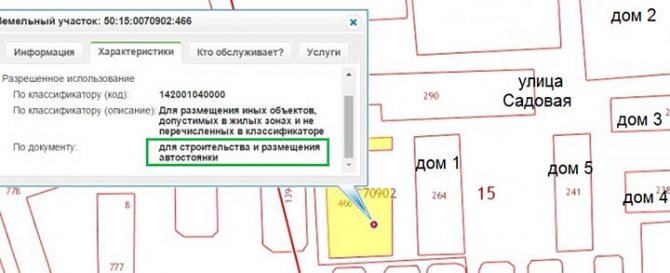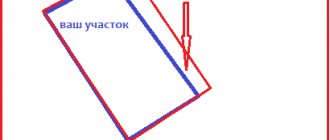The land fund is the totality of all plots located on the territory of the Russian Federation. It is a national treasure and considered a strategic resource. Land registration and systematization is carried out based on their type and quality. The adopted reforms make the management and regulation process more transparent and understandable for all market participants.
In this article we will tell you what classifiers and codes of land plots are, why they are needed and how to correctly read their decoding.
What is a site classifier?
All lands on the territory of the Russian Federation have their own purpose. Each site has a so-called VRI (type of permitted use).
This concept can be found in various legislative and regulatory acts intended to determine the nature of permitted activities in a particular territory.
Distribution of land resources of the Russian Federation
Classification codes were introduced precisely to indicate that a land resource belongs to one of the existing categories. By analyzing the code, you can understand what can be done on a specific plot of land and what is prohibited by law.
Each land plot has its own code designation, name and description. The classifier contains all this information. And they are necessarily taken into account when concluding property transactions.
If you are planning to buy a plot, receive it from the state, or lease it, or inherit it, it is recommended that you learn how to analyze this data. Violation of these regulations is subject to administrative liability.
How to find out the VRI of a site?
The main function of code systematization is to reflect land use conditions. Re-registration of status is regulated at the level of local legislation, and each VRI is determined by a separate document.
You can obtain information about a plot of land purchased in the Moscow region in the following ways:
- Visit the Rosreestr website . To obtain the necessary data, you must pay the state fee, send a request, and review the information provided;
- Take an extract from the Unified State Register of Real Estate . This document has come to replace the cadastral passport. In it you can see information about technical information and rights in relation to the land plot. The extract can be obtained from the cadastral office or on specialized websites. The list of required documents includes a receipt for payment of the state duty, power of attorney, and passport.
“Land Code of the Russian Federation” dated October 25, 2001 N 136-FZ, as amended in force from May 1, 2021
Preface
The Land Code of the Russian Federation (LLC RF) has been in force since the date of its publication (in Rossiyskaya Gazeta, No. 211-212) - October 30, 2001.
During this time, the Code has undergone significant changes. Many changes and additions have been made to the RF Land Code.
Land legislation
Land legislation is not represented only by the Land Code.
We have to admit that modern Russian land legislation, despite the presence of a codified act, remains unsystematized.
In addition to the Land Code of the Russian Federation, land relations at the federal level are regulated by many Federal laws (Federal Law of October 25, 2001 N 137-FZ “On the implementation of the Land Code of the Russian Federation”, Federal Law of June 18, 2001 N 78-FZ “On land management ", Federal Law of July 24, 2002 N 101-FZ "On the turnover of agricultural land", Federal Law of December 21, 2004 N 172-FZ "On the transfer of lands or land plots from one category to another", Federal Law of 10 January 1996 N 4-FZ “On land reclamation” and many others). In addition, on issues of joint jurisdiction of the Russian Federation and its subjects, land legislation is represented by laws and other acts of the subjects of the Federation.
Participants in land legal relations
Subjects of land relations are named in Article 5 of the Land Code of the Russian Federation. These are both Russian citizens and legal entities, and foreign ones.
This article of the Code, depending on the scope of rights to a land plot, distinguishes the following categories of land rights holders:
- land owners;
- land users (owners with the right of permanent (perpetual) use or with the right of free use);
- landowners (owners with the right of lifelong inheritable ownership);
- tenants of land plots – (owners under a lease agreement, sublease agreement).
Easement holders are also distinguished - these are persons who have the right to limited use of other people's land plots.
On the right of permanent (indefinite) use and lifelong inheritable ownership of a land plot
As of March 1, 2015, the following articles of the Land Code of the Russian Federation, devoted to certain real rights to land plots, have lost force:
- Art. 20 of the Land Code of the Russian Federation “Permanent (indefinite) use of land plots”
- Art. 21 of the Land Code of the Russian Federation “Lifetime inheritable ownership of land plots”
Currently, land plots are not provided to individuals on these titles. Land plots provided to persons on such titles can be re-registered as ownership or lease rights.
These changes in land legislation, however, do not mean that the real rights to land plots that have already arisen have sunk into oblivion and no longer exist in nature.
The corresponding articles remained in the Civil Code of the Russian Federation (Articles 265 of the Civil Code of the Russian Federation - 269 of the Civil Code of the Russian Federation).
But the given norms of the Civil Code of the Russian Federation, as we see, refer to land legislation.
Turning to land legislation, we can see Article 39.9 of the Land Code of the Russian Federation (“Provision of a land plot in state or municipal ownership for permanent (indefinite) use).”
As for the right of lifelong inheritable ownership, the new edition of the Land Code of the Russian Federation does not contain any norms dedicated to it.
This state of affairs, however, does not mean that citizens who own land plots granted to them on the right of lifelong inheritable ownership find themselves in a complete legal vacuum. At the same time, it should be noted that the exclusion of the above provisions of the RF Land Code creates some legal uncertainty.
Re-registration of rights to a land plot for lease or ownership
Article 3 of the Federal Law of October 25, 2001 N 137-FZ “On the Enactment of the Land Code of the Russian Federation” contains rules on the acquisition of land plots into ownership or the re-registration of the right of permanent (perpetual) use to the right of lease.
In accordance with paragraph 1 of Article 3 of Law N 137-FZ, land rights not provided for by the Land Code of the Russian Federation are subject to re-registration from the date of entry into force of the Land Code of the Russian Federation. The right of permanent (indefinite) use of land plots in state or municipal ownership that arose among citizens or legal entities before the entry into force of the Land Code of the Russian Federation is retained. The right of lifelong inheritable ownership of land plots in state or municipal ownership, acquired by a citizen before the date of entry into force of the Land Code of the Russian Federation, is retained.
It remains possible to re-register the right of permanent (perpetual) use and lifelong inheritable ownership of a land plot to the right of ownership free of charge (Clause 4 of Article 3 of Law No. 137-FZ).
So, state policy is aimed at reducing such property rights to land as the right of lifelong inheritable possession and the right of permanent (perpetual) use.
If there is a dispute about the right to a land plot and the possibility of transferring it into ownership, the dispute is resolved in court, which is a rather common occurrence in Russian practice.
Below is the text of the document:
Land Code of the Russian Federation" dated October 25, 2001 N 136-FZ with the latest amendments introduced by Federal Law dated April 20, 2021 N 92-FZ.
The edition begins on May 1, 2021 (rev. 122)
October 25, 2001
N 136-FZ
RUSSIAN FEDERATION
LAND CODE OF THE RUSSIAN FEDERATION
Adopted by the State Duma on September 28, 2001
Approved by the Federation Council on October 10, 2001
Chapter I. General provisions
Article 1. Basic principles of land legislation Article 2. Land legislation Article 3. Relations regulated by land legislation Article 4. Application of international treaties of the Russian Federation Article 5. Participants in land relations Article 6. Objects of land relations Article 7. Composition of lands in the Russian Federation Article 8 Assigning lands to categories, transferring them from one category to another Article 9. Powers of the Russian Federation in the field of land relations Article 9.1. Transfer of the exercise of powers of federal executive authorities in the field of land relations to executive authorities of the constituent entities of the Russian Federation Article 10. Powers of the constituent entities of the Russian Federation in the field of land relations Article 10.1. Redistribution of powers between local government bodies and government bodies of a constituent entity of the Russian Federation Article 11. Powers of local government bodies in the field of land relations
Chapter I.1. Formation of land plots
Article 11.1. Article 11.2 has become invalid. Formation of land plots Article 11.3. Formation of land plots from lands or land plots in state or municipal ownership Article 11.4. Division of land Article 11.5. Allocation of land Article 11.6. Consolidation of land plots Article 11.7. Redistribution of land plots Article 11.8. The emergence and preservation of rights, encumbrances (restrictions) on created and changed land plots Article 11.9. Requirements for created and changed land plots Article 11.10. Layout of a land plot or land plots on the cadastral plan of the territory
Chapter II. Land protection
Article 12. Goals of land protection Article 13. Content of land protection Article 14. Use of lands and land plots contaminated with chemicals, including radioactive, other substances and microorganisms
Chapter III. Land ownership
Article 15. Land ownership of citizens and legal entities Article 16. State ownership of land Article 17. Ownership of the Russian Federation (federal ownership) of land Article 18. Land ownership of subjects of the Russian Federation Article 19. Municipal ownership of land
Chapter IV. Limited use of other people's land plots (easement, public easement), lease of land plots, gratuitous use of land plots
Articles 20 - 21. Repealed Article 22. Lease of land Article 23. The right of limited use of someone else's land plot (easement, public easement) Article 24. Free use of land plots
Chapter V. Emergence of rights to land
Article 25. Grounds for the emergence of rights to land Article 26. Documents on rights to land plots Article 27. Limitations on the turnover of land plots Articles 28 - 34. No longer in force Article 35. Transfer of rights to a land plot when transferring ownership of a building, structure Article 36. No longer in force Article 37. Features of the purchase and sale of land Articles 38 - 39. No longer in force
Chapter V.1. Provision of land plots in state or municipal ownership
Article 39.1. Grounds for the emergence of rights to land plots provided from lands in state or municipal ownership Article 39.2. Executive bodies of state power and local government bodies authorized to provide land plots Article 39.3. Cases of sale of land plots in state or municipal ownership, at auction and without auction Article 39.4. Sale price of a land plot in state or municipal ownership Article 39.5. Cases of providing a land plot in state or municipal ownership to a citizen or legal entity for free ownership Article 39.6. Cases of granting land plots in state or municipal ownership for rent at auction and without auction Article 39.7. Amount of rent for a land plot in state or municipal ownership Article 39.8. Peculiarities of a lease agreement for a land plot in state or municipal ownership Article 39.9. Providing a land plot in state or municipal ownership for permanent (indefinite) use Article 39.10. Providing a land plot in state or municipal ownership for free use Article 39.11. Preparation and organization of an auction for the sale of a land plot in state or municipal ownership, or an auction for the right to conclude a lease agreement for a land plot in state or municipal ownership Article 39.12. Conducting an auction for the sale of a land plot in state or municipal ownership, or an auction for the right to conclude a lease agreement for a land plot in state or municipal ownership Article 39.13. Auction for the sale of a land plot in state or municipal ownership, or an auction for the right to conclude a lease agreement for a land plot in state or municipal ownership in electronic form Article 39.14. The procedure for granting ownership, lease, permanent (perpetual) use, gratuitous use of a land plot in state or municipal ownership, without bidding Article 39.15. Preliminary approval of the provision of a land plot Article 39.16. Grounds for refusal to provide a land plot in state or municipal ownership without holding a tender Article 39.17. Provision of a land plot in state or municipal ownership without holding a tender Article 39.18. Features of the provision of land plots in state or municipal ownership to citizens for individual housing construction, running personal subsidiary plots within the boundaries of a settlement, gardening, citizens and peasant (farm) farms for the peasant (farm) farm to carry out its activities Article 39.19. Features of providing land plots in state or municipal ownership to certain categories of citizens free of charge Article 39.20. Features of the provision of a land plot in state or municipal ownership on which a building or structure is located
Chapter V.2. Exchange of a land plot in state or municipal ownership for a land plot in private ownership
Article 39.21. Cases of exchange of a land plot in state or municipal ownership for a land plot in private ownership Article 39.22. Terms of the agreement for the exchange of a land plot in state or municipal ownership for a land plot in private ownership
Chapter V.3. Establishment of an easement in relation to a land plot that is in state or municipal ownership
Article 39.23. Grounds for establishing an easement in relation to a land plot located in state or municipal ownership Article 39.24. Persons entering into agreements to establish an easement in relation to a land plot that is in state or municipal ownership Article 39.25. Agreement on the establishment of an easement in relation to a land plot located in state or municipal ownership Article 39.26. The procedure for concluding an agreement on the establishment of an easement in relation to a land plot that is in state or municipal ownership
Chapter V.4. Redistribution of lands and (or) land plots in state or municipal ownership among themselves and such lands and (or) land plots and land plots in private ownership
Article 39.27. Cases and grounds for the redistribution of lands and (or) land plots in state or municipal ownership among themselves Article 39.28. Cases and grounds for redistribution of lands and (or) land plots in state or municipal ownership, and land plots in private ownership Article 39.29. The procedure for concluding an agreement on the redistribution of lands and (or) land plots in state or municipal ownership, and land plots in private ownership
Chapter V.5. Free transfer of land plots in federal ownership to municipal ownership or to the ownership of constituent entities of the Russian Federation
Article 39.30. Cases and grounds for the gratuitous transfer of land plots in federal ownership to municipal ownership or to the ownership of constituent entities of the Russian Federation Article 39.31. The procedure for the gratuitous transfer of a land plot in federal ownership to municipal ownership or to the ownership of a constituent entity of the Russian Federation Article 39.32. Grounds and procedure for terminating the rights of third parties to a land plot transferred free of charge from federal property
Chapter V.6. Use of lands or land plots that are in state or municipal ownership, without the provision of land plots and the establishment of an easement or public easement
Article 39.33. Cases and grounds for the use of lands or land plots that are in state or municipal ownership, without the provision of land plots and the establishment of an easement, public easement Article 39.34. The procedure for issuing permission to use land or a land plot that is in state or municipal ownership Article 39.35. Obligation of persons using lands or land plots that are in state or municipal ownership on the basis of permits Article 39.36. Use of lands or land plots in state or municipal ownership for the placement of non-stationary retail facilities, advertising structures, as well as facilities, the types of which are established by the Government of the Russian Federation
Chapter V.7. Establishment of a public easement for certain purposes
Article 39.37. Purposes of establishing a public easement Article 39.38. Bodies deciding on the establishment of a public easement Article 39.39. Conditions for establishing a public easement Article 39.40. Persons who have the right to apply for the establishment of a public easement Article 39.41. Petition for the establishment of a public easement Article 39.42. Identification of rights holders of land plots for the purpose of establishing a public easement Article 39.43. Decision to establish a public easement Article 39.44. Refusal to establish a public easement Article 39.45. Duration of public easement Article 39.46. Payment for public easement Article 39.47. Agreement on the implementation of a public easement Article 39.48. Consequences of the impossibility or significant difficulty of using a land plot (part thereof) burdened with a public easement Article 39.49. Features of a public easement established for the purpose of reconstructing an engineering structure that is transferred in connection with the seizure of a land plot for state or municipal needs Article 39.50. Rights and obligations of the owner of a public easement
Chapter VI. Rights and obligations of land owners, land users, landowners and land tenants when using land plots
Article 40. Rights of owners of land plots to use land plots Article 41. Rights to use land plots by land users, landowners and tenants of land plots Article 42. Responsibilities of owners of land plots and persons who are not owners of land plots for the use of land plots Article 43. Implementation rights to land
Chapter VII. Termination and limitation of land rights
Article 44. Grounds for termination of the right of ownership of a land plot Article 45. Grounds for termination of the right of permanent (perpetual) use of a land plot, the right of lifelong inheritable ownership of a land plot Article 46. Grounds for termination of the lease of a land plot Article 47. Grounds for termination of the right to free use of a land plot Article 48 Grounds for termination of easement Article 49. Grounds for seizure of land plots for state or municipal needs Article 50. Confiscation of a land plot Article 51. Requisition of a land plot Article 52. Conditions and procedure for alienation of a land plot Article 53. Conditions and procedure for a person to renounce the right to a land plot Article 54. The procedure for the withdrawal of a land plot granted on the right of lifelong inheritable possession, the right of permanent (indefinite) use, due to non-use of the land plot for its intended purpose or use of the land plot in violation of the legislation of the Russian Federation Article 54.1. The procedure for the alienation of a land plot that is privately owned in the event of its seizure due to the non-use of such a land plot for its intended purpose or the use of such a land plot in violation of the legislation of the Russian Federation Article 55. Repealed Article 56. Restriction of rights to land Article 56.1. Restrictions on land rights in connection with the reservation of lands for state or municipal needs
Chapter VII.1. The procedure for the seizure of land plots for state or municipal needs
Article 56.2. Bodies making decisions on the seizure of land plots for state or municipal needs Article 56.3. Conditions for the withdrawal of land plots for state or municipal needs Article 56.4. Petition for seizure of a land plot for state or municipal needs Article 56.5. Identification of persons whose land plots and (or) real estate objects located on them are subject to seizure for state or municipal needs Article 56.6. Decision on seizure of land plots for state or municipal needs Article 56.7. Preparation of an agreement on the seizure of land plots and (or) real estate located on them for state or municipal needs Article 56.8. Features of determining the amount of compensation in connection with the seizure of land for state or municipal needs Article 56.9. Agreement on the seizure of real estate for state or municipal needs Article 56.10. Conclusion of an agreement on the seizure of real estate for state or municipal needs Article 56.11. Termination and transfer of rights to a land plot and (or) real estate objects located on it in connection with their seizure for state or municipal needs Article 56.12. Features of the seizure of land plots and (or) real estate located on them for the purpose of integrated development of the residential development territory, integrated development of the non-residential development territory
Chapter VIII. Compensation for losses in case of deterioration in the quality of land, restriction of the rights of land owners, land users, land owners and tenants of land plots, rights holders of real estate located on land plots
Article 57. Compensation for losses in case of deterioration in the quality of land, restriction of the rights of owners of land plots, land users, land owners and tenants of land plots, rights holders of real estate located on land plots Article 57.1. Features of compensation for damages in case of restriction of rights in connection with the establishment or change of zones with special conditions for the use of territories Article 58. Repealed
Chapter IX. Protection of land rights and consideration of land disputes
Article 59. Recognition of the right to a land plot Article 60. Restoration of the situation that existed before the violation of the right to a land plot, and the suppression of actions that violate the right to a land plot or create a threat of its violation Article 61. Invalidation of an act of an executive body of state power or an act of a local body self-government Article 62. Compensation for losses Article 63. Repealed Article 64. Consideration of land disputes
Chapter X. Payment for land and land valuation
Article 65. Payment for the use of land Article 66. Valuation of land
Chapter XI. Land monitoring, land management, state cadastral registration of land plots and land reservation for state and municipal needs
Article 67. State monitoring of lands Article 68. Land management Article 69. Organization and procedure for land management Article 70. State cadastral registration of land plots Article 70.1. Reservation of land for state or municipal needs
Chapter XII. State land supervision, municipal land control and public land control
Article 71. State land supervision Article 71.1. Features of organizing and conducting inspections of compliance with the requirements of land legislation Article 71.2. Administrative inspection of objects of land relations Article 72. Municipal land control Article 72.1. Public land control Article 73. Repealed
Chapter XIII. Responsibility for offenses in the field of protection and use of land
Article 74. Administrative and criminal liability for land offenses Article 75. Disciplinary liability for land offenses Article 76. Compensation for damage caused by land offenses
Chapter XIV. Agricultural land
Article 77. Concept and composition of agricultural land Article 78. Use of agricultural land Article 79. Features of the use of agricultural land Article 80. Land redistribution fund Articles 81 - 82. Repealed
Chapter XV. Lands of settlements
Article 83. The concept of lands of settlements and the concept of boundaries of settlements Article 84. The procedure for establishing or changing the boundaries of settlements Article 85. Composition of lands of settlements and zoning of territories Article 86. Repealed
Chapter XVI. Lands of industry, energy, transport, communications, radio broadcasting, television, computer science, lands for space activities, defense lands, security lands and lands for other special purposes
Article 87. Composition of industrial lands, energy, transport, communications, radio broadcasting, television, computer science, lands for space activities, defense lands, security lands and lands for other special purposes Article 88. Industrial lands Article 89. Energy lands Article 90. Transport lands Article 91. Lands for communications, radio broadcasting, television, computer science Article 92. Lands for supporting space activities Article 93. Lands for defense and security
Chapter XVII. Lands of specially protected territories and objects
Article 94. The concept and composition of lands of specially protected territories Article 95. Lands of specially protected natural territories Article 96. Lands of medical and recreational areas and resorts Article 97. Lands of environmental purposes Article 98. Lands of recreational purposes Article 99. Lands of historical and cultural purposes Article 100 Particularly valuable lands
Chapter XVIII. Forest fund lands, water fund lands and reserve lands
Article 101. Lands of the forest fund Article 102. Lands of the water fund Article 103. Lands of the reserve
Chapter XIX. Zones with special conditions for the use of territories
Article 104. The purposes of establishing zones with special conditions for the use of territories Article 105. Types of zones with special conditions for the use of territories Article 106. Establishment, change, termination of the existence of zones with special conditions for the use of territories Article 107. Consequences of the establishment, change, termination of the existence of zones with special conditions use of territories
President of the Russian Federation V. PUTIN
Moscow, Kremlin October 25, 2001 N 136-FZ
Basic codes of permitted use of memory
The land plot classifier consists of 13 categories. All suburban lands can be classified into the following sections:
- Buildings and structures that are used for agricultural purposes (1.1-1.18) . They are particularly important objects. This is precisely the reason for strict supervision of activities carried out in these areas. The determining factor is the location of the land;
- Country and garden farms (13.1-13.3);
- Individual construction (2.0) . Private houses with an attached plot. An exception may be health institutions, hotel complexes, temporary housing and correctional institutions.
- Buildings intended for business activities (4.0).
- Land resources used for recreational purposes (5.0) . These include tourist centers, hotels, places for hunting and fishing.
- Industrial lands permitted for the location of production (6.0) . Many objects are located on the periphery.
- Security and Defense (8.0) . Test sites, settlements, observation towers and weapons depots.
- Resorts, conservation and study of natural resources (9.0-11.0).
- Properties held for public use (12.0).
How are plots divided by type of permitted use?
The main systematization of VRI occurred back in 2014. They are divided into:
- main type of permitted use
- auxiliary VRI
- conditional VRI
The areas to which the main VRI have a full code. They can only be used as specified in the documentation governing the Land Trust. If a citizen violates the instructions established for certain areas, sanctions are imposed on him. The personal opinion of the owner does not matter.

When disposing of areas classified as a conditional type of permitted use , it is also prohibited to go beyond the scope of the systematized classifier. The only difference between these VRIs is the broader regulations.
The attitude towards the desires of the citizen in this case is more loyal than in the previous one. The buildings comply with the prescribed installations, but if necessary, you can place something of your own on the site. In this case, the classification code will reflect the linking of the property to the defining point. In this case, it is necessary to coordinate actions with the employees of the town planning chamber.
Auxiliary species are never used as independent definitions. This is due to the lack of sufficient legal force. Land plots are tied to them if there are nuances that cannot be circumvented.
Our address: 248001, Kaluga, st. Lenina, 77, off. 25 (2nd floor),
All owners of land plots that did not undergo land surveying overnight became simply users who can only use the plot for their own needs. It is now impossible to sell, donate, include a plot of land in an inheritance, mortgage it to a bank, etc., until a record of the plot appears in the unified state real estate register. And this entry can appear only after the land surveying procedure. According to innovations in land legislation, land plots are subject to mandatory registration in the Unified State Register of Real Estate. If the owner cannot be found in the registers for five years, his land may be declared ownerless, and then it will go to the state. Many purchased real estate during the Soviet era, and not all of our grandparents took care of registering the land plot. Therefore, those who received such land by inheritance, gift or other means must register it so as not to lose their right of ownership. New law on land plots 2021 You should hurry to legalize your rights to own one or another plot of land, because from the first days of January 2021, parliament plans to establish an unquestioning ban on the disposal of those plots in respect of which land surveying has not been carried out. Accordingly, if land surveying has not been formalized by 2021, then any individual will be officially prohibited from disposing of the land. Changes in land legislation since January 2021: will owners really be deprived of land? Amendments to the Real Estate Law, which come into force at the beginning of 2021, have caused a lot of noise. The threat of their seizure hangs over the owners of land plots. Does the new law really allow the state to deprive land owners? And who will these changes affect? Features of the new law on land surveying for free in 2021 Changes in land legislation, in particular in determining the boundaries of plots, have given rise to a lot of speculation. The end of the “dacha amnesty” in December 2021 obligated plot owners to prepare documents at their own expense. It is already impossible to survey a dacha plot of land for free; the new law clearly interprets that this is done at the expense of the owners. Establishing the actual boundaries of the plot is necessary for drawing up a correct cadastral map. It indicates the characteristics of all sites, including area, purpose and location with neighboring ones. This information is needed to calculate the correct tax amount. How to carry out land surveying in 2021 How is mandatory land surveying carried out from January 1, 2021? The cadastral engineer accepts the land user's request, and based on the documentation received from the owner, land surveying is carried out. Then the performer of cadastral work must bring information about the results of surveying to Rosreestr in order to enter information into the Unified State Real Estate Cadastre, or the municipality independently presents this information to Rosreestr in the form of a map plan (final documentation of complex work). One way or another, the necessary information will be entered into the cadastre without the participation of the owner, if he contacts the complex work contractor and provides the necessary data. We recommend reading: Tax on lottery winnings in Russia Every citizen of Russia, when registering any type of land plot, must register it in the personnel register. But this operation cannot be carried out if there is no special boundary plan for the site. As was the case before, such a plan is needed to indicate clear boundaries and coordinates of the location of the territory, however, the boundary plan will be slightly changed from January 1, 2021. What is land surveying according to the new law of 2021? The customer for complex cadastral work can be a municipality or the Ministry of Property Relations of the region. The owner can find out whether his site is included in the land surveying project by contacting one of these structures. It is better to make your request in writing. With the entry into force of amendments to the Land Code of the Russian Federation, land surveying has become mandatory. Land surveying is a necessary condition for owning land by right and disposing of it. The legislator plans to complete this procedure by the end of 2021. For those who do not do this, it will become impossible to legalize buildings on this site, as well as sell it, donate it, etc. New procedure for confiscation of land plots in 2021: what you need to know to avoid becoming a victim of arbitrariness Already today, many municipal websites contain appeals from local authorities to the population and organizations about the entry into force of the new law. Local authorities, according to the law, have received additional powers and, according to experts, are now an interested party. According to the State Duma Committee on Agrarian Issues, about 22 million hectares could go into the hands of municipalities of unclaimed land alone. If they are then sold for 15% of the cadastral value (the law establishes no more than this percentage for sale), then local budgets will be replenished by 55 billion rubles. “A procedure has been established that determines the right of an agricultural organization or peasant (farm) enterprise using a land plot to apply to a local government body with an application to conclude a purchase and sale agreement for a land plot or a lease agreement within three months from the date of state registration of municipal property rights at a price not more than 15 percent of the cadastral value of the land plot (for purchase and sale), explained Nikolay Stepanov, partner at Legal. — Bidding for the right to conclude a sales or lease agreement is not held, which can significantly increase the number of transactions with agricultural land plots. Moreover, the municipal body is obliged, within two weeks from the moment of state registration of the right to a land plot allocated as land shares, to publish in the media and post on its official website on the Internet information about the possibility of acquiring such a land plot." New changes in the law on land plots in 2021 In the future, resolving the situation and returning the plot will be difficult and only possible through the court. An important point is also the fact that if the plot was registered before 2012, then it will not be listed in the State Cadastre. Summer residents who have not yet managed to complete the registration may suffer significantly in such a situation. The main difficulty of the procedure for registering property is that you will not only have to submit an official application to the State Cadastre for registration, but also contact surveyors and carry out land surveying. The event itself is considered a rather expensive and lengthy procedure. We recommend reading: Transporting children in a car from June 1, 2020 in the front seat Algorithm for land surveying in 2020 The surveying procedure can only be carried out by qualified specialists, who must have a license. The company is selected based on the following criteria: the presence of certification, the number of certified engineers (there must be more than three people) and information about the engineer in Rosreestr. transferred into the possession or use of another citizen (this also includes the territories of municipal or state authorities); which is redistributed depending on any circumstances; which must be divided, transferred or combined. Is it possible to survey a land plot for free? The new law on the land cadastre came into force on January 1, 2020. With its adoption, a lot changes in the procedure for registering land rights and entering data on land plots into the cadastre. A new unified accounting and registration system and a unified state real estate register (USRN) are being created. All information that is already contained in the cadastre will be transferred to the Unified State Register of Real Estate. This system will be created gradually, but all new registration activities will take place in accordance with the law that has entered into force. Complex cadastral works are carried out in accordance with a special federal program. Its implementation will reduce the number of unregistered plots and expand the tax base. There is also a plus for landowners - they will be able to obtain documents for their property for free. New law on gardening from January 1, 2021 Previously, plots with various permitted uses were registered. In accordance with the new law, plots with permitted use “for gardening”, “for gardening”, “dacha land plot”, “for dacha farming”, “for dacha construction” are considered garden land plots from January 1, 2020. Before January 1, 2024, the issue of the gratuitous transfer of public property (including a general purpose land plot) owned by the partnership into the common shared ownership of gardeners in proportion to the area of their plots must be brought up for consideration at the general meeting. Land surveying for free, new law 2021 in Crimea Prepare documents. In most cases, an extract from the Unified State Register and a passport are sufficient. You can order information from the Unified State Register of Real Estate in electronic form. For this I recommend the Ktotam service. Pro, which sends a completed statement within an hour. The cost is the same as in the MFC - 250 rubles. Official data - from the Unified State Register of Rosreestr and confirmed by the registrar’s electronic digital signature (EDS); As already noted, the event must be carried out by specialized companies or entrepreneurs who have official permission to engage in such activities. Since the equipment and the license itself are expensive, the land surveying procedure is most often paid and the cost is quite impressive. For many landowners, this becomes a significant obstacle to complying with legal requirements. Land surveying until 2021: the law The initiator is periodically the owner of the plot, as well as officials. The landowner is required only to provide the necessary papers, as well as access to the designated area. If you or one of your neighbors asks for mandatory land surveying at your dachas, the time frame is agreed upon and a written notification is sent. In fact, people are beginning to think that only the state is interested in surveying their territory, since this is fraught with new tax payments. But in this state of affairs it is also possible to find a refutation; surveyors can explain everything in accessible language.





